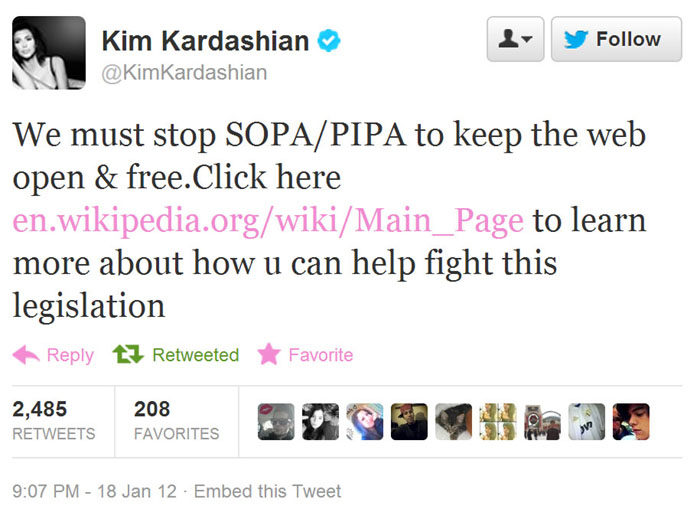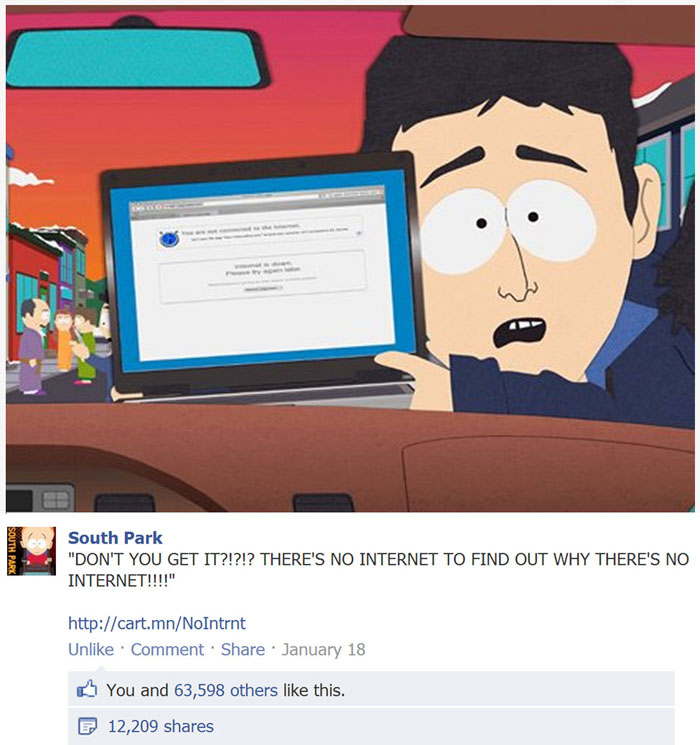Hacking Politics: How Geeks, Progressives, the Tea Party, Gamers, Anarchists, and Suits Teamed Up to Defeat SOPA and Save the Internet (47 page)
Authors: and David Moon Patrick Ruffini David Segal
Tags: #Bisac Code 1: POL035000

What happened on SOPA and PIPA was truly unprecedented. You can usually chart the success of legislation by determining the relative power of the lobby pushing for it. SOPA and PIPA had not just Hollywood, a critical fundraising source for Democrats, behind it, but also the U.S. Chamber of Commerce, just as critical a fundraising source for Republicans. Eventually, major Silicon Valley tech companies came out against SOPA/PIPA. But they were smaller players in Washington, newer to the scene, and without the same institutional links to members and their staffs. The aforementioned ex-Senator Dodd, after all, now ran the Motion Picture Association of America. House Judiciary Committee Chair Lamar Smith’s staffers wrote the bill right before becoming entertainment industry lobbyists. In a straight-up fight between the two sides, I would have taken Hollywood in a second.
In short, the Internet beat SOPA and PIPA. And I mean the entire damn thing.
Regardless of political ideology or even a political background, content providers and the users who loved them bombarded Congress in ways we have not seen before or since. At one point Tumblr announced they were generating 3.6 calls per second to Congress. And it worked. Once the bill gained a high profile among the online community, lazy endorsements from politicians and corporations turned toxic. Members of Congress, corporate supporters and even the White House walked away from the bill in droves. The lead sponsors in the House and Senate tried to bargain and tweak and alter the bill to appease the opposition. But in the end, SOPA and PIPA never got a vote, even at the committee level.
You could have watched the nightly news every day during these few months, and wouldn’t have known that any of this happened. The progressive watchdog Media Matters noted in mid-January 2012 that none of the major broadcast or cable news networks ever produced a segment on the SOPA/PIPA fight in their primetime coverage. That’s because ABC, CBS, NBC, Fox and CNN all supported the bill.
Online, however, this was a major story for months, culminating in the SOPA Strike, on January 18, 2012, the largest online strike in history, when sites from Wikipedia on down redacted their content and posted nothing but links and information to help users contact Congress and register their dissent. Only then did traditional media, pretending they hadn’t heard of SOPA or PIPA until this point, acknowledge the issue. By that time, the story was over. The bills died just two days later. Legislation that would have knee-capped the Internet ended up displaying the power of the Internet to drive the national policy conversation, without any participation from its Big Media counterparts.
You can get very triumphalist about the power of ordinary people to engage politically and force their leaders to heel, even when fighting the largest and most influential interests in the country. In reality, it doesn’t happen that often. Activism and people power does not always work. Sometimes the opposing forces are too big, and sometimes the activist strategy is too diffuse. Stopping policy is hard and often futile work. What’s more, it never ends: the next-wave version of SOPA or PIPA surely sits in the desk of an entertainment industry lobbyist. But every once in a while, the right combination of political muscle, innovative activism, and indefatigable will can disrupt the normal course of business on Capitol Hill.
About a month after the SOPA fight ended, I attended a debate between two Congressional Democrats, Howard Berman and Brad Sherman, in the shadow of the movie studios and production facilities in the San Fernando Valley. Berman and Sherman had been drawn into the same district for the 2012 election, and due to new California election laws, would face one another in a head-to-head matchup in November. Both of them, being Southern California Democrats, took massive amounts of money from Hollywood. Sherman took a populist line throughout the campaign, and at the debate he called SOPA “not well-designed.” Berman, still in thrall to Hollywood
cash, described SOPA as a “property rights” issue, and chalked up the recent takedown of the legislation to a “disinformation campaign.” You couldn’t drive around the Valley without seeing Berman campaign material after that. Berman held fundraising events at the homes of just about every big donor in Hollywood. He was even a special guest when President Obama held a fundraiser at George Clooney’s house.
They just finished the campaign. Sherman beat Berman by 21 points.
DAVID MOON
On June 22, 2011, I started Googling around to find contact information for the head of Google’s lobbying division, as well as for the person that designs the art for their search engine. I wanted to ask them to join in the disruption of public consciousness by placing a message about Internet censorship legislation on the homepage of
Google.com
. I finally found email addresses for Alan Davidson (Google’s head of lobbying at the time) and Ryan Germick—the man responsible for creating the art that Google rotates on its search engine page. See an excerpt from my email message to the Googlers below:
Our four hundred thousand members are primarily concerned with stopping PIPA and have sent over fifty thousand emails to Congress on the issue. Thousands have also called their senators to urge opposition to the bill. We now have agreement from a few Congressional offices to hold a staff briefing to highlight the various flaws of PIPA.
Meanwhile, we’ve been reaching out to dozens of groups to generate additional opposition to the bill (see attached list). We’ve made inroads with seniors’ groups on prescription drug issues in PIPA, as well as right wing groups concerned with the speech implications.
Even with all this, it seems we are lacking broad public awareness (and the resulting fear from members of Congress). But we were realizing that you at Google are sitting on perhaps the world’s greatest pedestal, given your massive presence on the web.
Would you be willing to use your rotating Google search engine art to highlight the free speech implications of what Congress is about to do?
By the fall of 2011, as the coalition of groups working with us on this campaign began to mushroom, I had begun dreaming of the advocacy possibilities latent in pushing websites under attack to draw their visitors’ attention toward the legislative fight in Congress. On November 14, 2011, I emailed a message to our coalition partners asking the following question by email:
Will a time come when the private sector net firms/sites will be willing to mobilize their user/customer bases for constituent contacts? I would just point out that the airline industry does this fairly regularly now … witness ie: United and other companies mobilizing their email lists to send in comments to the FAA re: new desired airline routes (ie: when a direct to Beijing line opened) …
I can only imagine the impact of Google, for example, changing its search engine art to a SOPA/PIPA-related image—one can only dream. :)
It took months of additional work by our coalition of Internet Freedom fighters, but my mouth still dropped on January 18, 2012 as the following image appeared on Google’s homepage:

Thousands of websites across the Internet “blacked out” and staged online protests to raise public consciousness about the dangers of SOPA/PIPA. In response, I emailed my colleague David Segal the following message: “ha. 2 months later it’s a new day. my god.” It was indeed a new day, and perhaps more than we are still able to grasp. It was the final dramatic action in a campaign that took a year and a half.
Though the downward slide of SOPA/PIPA had been well in progress for months, by January 18, 2012 it was impossible even for the bills’ proponents to deny that they were dead. Epic win. Ironically, throughout much of this process, Demand Progress was accused of being puppets of Google. But this email chain hopefully debunks the idea that Google owned or served as puppet-master of the anti-SOPA/PIPA coalition. In fact, for many months it felt like we were trying to draft them into our guerilla battles. Indeed, this fight was much bigger than Google or any one company or website.
Proof? Even Kim Kardashian got in on the action. On the evening of January 18, 2012, the celebrity most famous for being famous tweeted the following warning to her millions of followers: “We must stop SOPA/PIPA to keep the web open & free.”

SOPA/PIPA activism had itself become a meta-meme, and all of sudden two bills that had been virtually ignored for months were being discussed everywhere.

South Park weighed in on the SOPA/PIPA battle with this image on its Facebook page on January 18, 2012.
The epic downfall of SOPA & PIPA was a turning point in the Internet’s political coming of age story, but it was a critical moment not because a celebrity (or many celebrities as was the case) swooped in and blessed the rebels. Indeed, before mid-January, Kardashian’s opposition to SOPA/PIPA had already been preceded by celebrity alerts from actors Ashton Kutcher and Olivia Wilde, filmmaker Kevin Smith, musician Trent Reznor and numerous other creators.

Pornhub.com
joined in the American Censorship Day protests by placing a link on the site’s homepage.
What made the participation of celebrities like Kim Kardashian notable, was not actually their fame. It was that on January 18th and the days that followed, many celebrities reacted like the rest of us did when they found out about SOPA.
Like millions of others, Kim Kardashian simply recognized her own identity as an Internet user and drew a very public line in the sand (well, we can at least say that of the person who manages Kardashian’s Twitter account). In fact, Congressional staffers later reported that the SOPA/PIPA battle had been the impetus for as many constituent contacts as any issue in memory—including recently contentious issues like health care and immigration. Somehow a bill related to DNS blocking rose to a similar level of public prominence—for at least a brief moment—but while Americans were sharply divided when it came to health care and immigration reform, they were overwhelmingly united in favor of the Internet.
It was a political coming of age: the Internet had truly arrived in Washington. In the weeks leading up to the blackout, most lawmakers were treated to decentralized barrages of hundreds of emails and phone calls about SOPA/PIPA. Their social media pages were filled with inquiries about the two bills from incredulous Netizens. Twitter announced that in the first 16 hours alone on January 18th, over 2.4 million users tweeted about SOPA/PIPA. Meanwhile, programmers and web developers were connecting online to coordinate visits with lawmakers, while in New York a tech meet-up group anchored a rally that saw thousands of protestors gather outside the offices of their senators. Along the way, coders interested in the effort went to work programming new contact tools for constituents, and witty individuals took to sites like YouTube and Facebook to launch viral alerts and satirical memes about SOPA/PIPA. Some bill sponsors like SOPA-backer Rep. Lamar Smith were particularly vilified by Internet humorists (some clever, some not).
